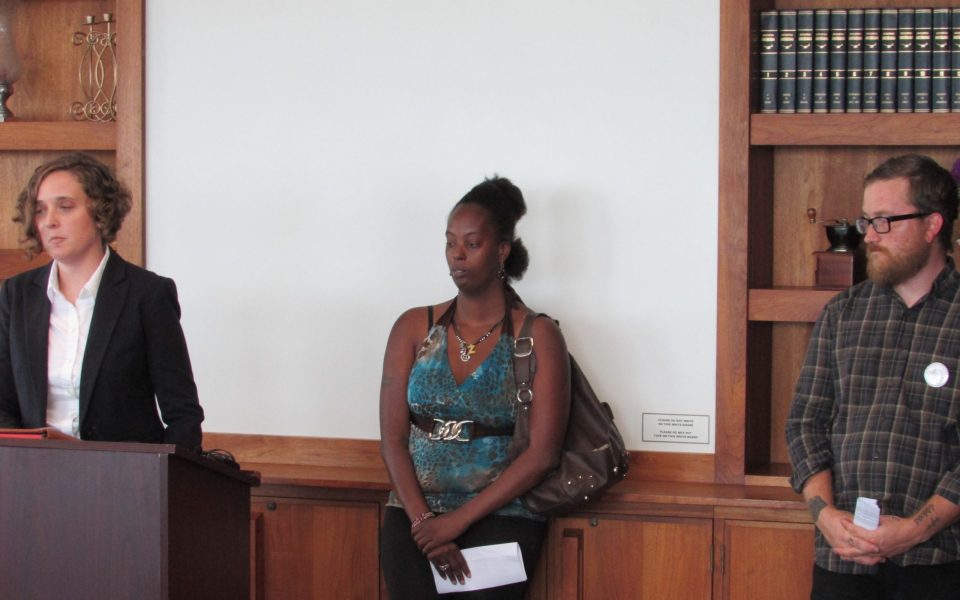The National Law Center on Homelessness and Poverty brought a legal challenge today against the city of Greensboro’s current panhandling ordinance.
The plaintiffs also include three Greensboro residents described as “living in poverty and in need of income from soliciting to meet their basic needs.” The federal lawsuit alleges violations of freedom of speech, equal protection and due process against the city. The suit also names City Manager David Parrish and police Chief Wayne Scott as defendants.
The lawsuit takes aim at an “aggressive solicitation” ordinance passed as a placeholder by a 5-4 majority of city council on July 24. Members indicated that they will likely replace the more restrictive “aggressive solicitation” ordinance on at the next meeting on Aug. 21 with a suite of ordinances aimed at addressing harassment.
“I haven’t panhandled since they passed this new law, but with my current situation I will need to get help from someone soon,” said plaintiff Zalonda Woods, who brought her infant child to a press conference at the Self-Help Building on Wednesday. “But because of this new law — the aggressive solicitation ordinance — I’m afraid to ask for help, even if I need it. And that is wrong. I don’t want to be arrested just because I ask someone for help. If I get a ticket, I know that I probably won’t be able to pay it without spending money that I need for my bills and to feed my family. And I can’t even imagine going to jail for this. I wouldn’t be able to manage.”
The lawsuit alleges that the city “enacted a series of restriction on solicitation that it knew had been held unconstitutional in federal courts across the county in the wake of the US Supreme Court’s decision in Reed v. Gilbert.”
The complaint alleges that the ordinance violates plaintiffs Zalonda Woods, Terry Lindsay and Sima Fallahi’s constitutional rights of free speech.
“It limits plaintiffs’ ability to use profane language of any sort in public,” the lawsuit reads. “It prohibits plaintiffs from gently tapping someone on the shoulder or placing a reassuring hand on someone’s arm in the course of politely asking for donations. It prohibits plaintiffs from sitting down to rest for a few minutes on a curb or sidewalk while holding a written sign asking for donations if it means other pedestrians would have to step to the side when walking past them.”
Mayor Nancy Vaughan told Triad City Beat that she doesn’t believe that the ordinance singles out panhandlers.
“I don’t believe we said people can’t panhandle,” she said. “There are other forms of solicitation besides panhandling, whether it’s trying to get someone to fill out a petition, or people wanting to save your eternal soul.”
Woods said she has likely engaged in conduct in the past that is criminalized under the current ordinance.
“The problem is that there are too many rules under the new ordinance that make it hard to know when I can ask for help and when I can’t,” she said. “I don’t know where every ATM is in the city. I’ve asked for people who were standing in line before, and I’ve sometimes asked people more than once. I’ve even hugged people who I’ve talked to on the street, but as I understand it all of this may be illegal under the new law.”
Emily Seawell, a lawyer for the ACLU of North Carolina, said the plaintiffs are asking the federal courts “to take the ordinance off the books immediately, to stop it from being in effect until the city council’s next chance to vote it down” on Aug. 21. She added, “If the council votes it down, we will applaud that move.”
The lawsuit does not address the replacement ordinance, which was drafted for the city by Parker Poe law firm. Seawell declined to say whether the plaintiffs would also challenge the replacement ordinance, which is expected to be approved by council on Aug. 21.
“Whatever ordinance that is enacted to replace this one we would just need to take a close look at that and analyze it the same way, look at how much it burdens speech, and is that burden on speech justified or not?” she said. “In this case it’s clearly not.”
Seawell added that the ACLU of North Carolina is has “been working with the city on what might replace this ordinance, so we want to continue that collaborative process.”
Mayor Vaughan said the city welcomes all stakeholders to help shape city policy.
“I find it interesting that they would sue over an ordinance that we plan on repealing on the 21st,” she said.
Join the First Amendment Society, a membership that goes directly to funding TCB‘s newsroom.
We believe that reporting can save the world.
The TCB First Amendment Society recognizes the vital role of a free, unfettered press with a bundling of local experiences designed to build community, and unique engagements with our newsroom that will help you understand, and shape, local journalism’s critical role in uplifting the people in our cities.
All revenue goes directly into the newsroom as reporters’ salaries and freelance commissions.


Leave a Reply